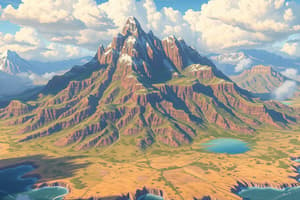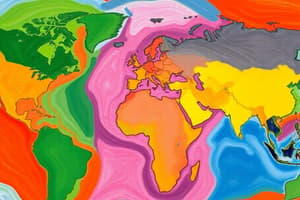Podcast
Questions and Answers
What types of methods do human geographers use to examine social and spatial patterns?
What types of methods do human geographers use to examine social and spatial patterns?
- Qualitative methods exclusively
- Both quantitative and qualitative methods (correct)
- Only qualitative methods
- Only quantitative methods
In which industries are skills in quantitative and qualitative methods, GIS, and spatial analysis highly sought after?
In which industries are skills in quantitative and qualitative methods, GIS, and spatial analysis highly sought after?
- Information technology industry
- Environmental science, public health, urban planning, and resource management industries (correct)
- Fashion industry
- Hospitality industry
What do research assistants in geography have the opportunity to develop skills in?
What do research assistants in geography have the opportunity to develop skills in?
- Quantitative and qualitative methods, GIS, remote sensing, and spatial analysis (correct)
- Automobile mechanics
- Financial auditing
- Cooking techniques
Why is geography considered a dynamic field?
Why is geography considered a dynamic field?
What can be gained by analyzing how climate change affects ecosystems according to the text?
What can be gained by analyzing how climate change affects ecosystems according to the text?
What does physical geography primarily focus on?
What does physical geography primarily focus on?
What tools do physical geographers use to investigate Earth's physical systems?
What tools do physical geographers use to investigate Earth's physical systems?
Why are climate zones important in geography?
Why are climate zones important in geography?
What is the main focus of human geography?
What is the main focus of human geography?
Why is the spatial organization of human activities important in human geography?
Why is the spatial organization of human activities important in human geography?
Study Notes
Geography: Exploring Physical, Climate, and Human Worlds
Geography is a rich and multifaceted discipline that intertwines physical, climatic, and human perspectives to understand our planet and human societies. As a research assistant, you'll delve into these subtopics to examine the interconnectedness of Earth's systems and the impact of human influence on the natural world.
Physical Geography
Physical geography encompasses the study of Earth's natural features, processes, and patterns. It explores topics such as landforms, water features, climates, ecosystems, and the interactions between them. Physical geographers utilize diverse tools like remote sensing, geographic information systems (GIS), and fieldwork to investigate how Earth's physical systems operate on local, regional, and global scales.
Climate Zones
Climate zones are areas of the world that share similar climates due to factors like latitude, topography, and ocean currents. They are essential in understanding how ecosystems and human societies adapt to various weather patterns, precipitation regimes, and temperatures. Climate zones play a crucial role in agricultural production, water resources, and wildlife habitats.
Human Geography
Human geography centers on the study of human societies, focusing on the spatial organization of human activities and interactions with their natural and built environments. It investigates topics like population distribution, migration, economic development, cultural identity, and urbanization. Human geographers utilize both quantitative and qualitative methods to examine social and spatial patterns and their implications for human well-being.
Research Opportunities
As a research assistant, you can contribute to the advancement of geographic knowledge in various fields. You might find yourself working with geographers, environmental scientists, sociologists, economists, and other professionals to gain insights into how people and the natural world interact, adapt, and change. You'll have the opportunity to develop skills in quantitative and qualitative methods, GIS, remote sensing, and spatial analysis. These skills are highly sought after in industries like environmental science, public health, urban planning, and resource management.
Conclusion
Geography is a dynamic field that offers a unique blend of physical, climatic, and human perspectives. As you delve into the world of geographic research, you'll discover the intricate relationships between Earth's physical systems and human societies. Whether you're analyzing how climate change affects ecosystems, mapping urban development, or assessing the impacts of natural disasters, geography is a rewarding and challenging field that will provide you with a thorough understanding of our complex world.
Studying That Suits You
Use AI to generate personalized quizzes and flashcards to suit your learning preferences.
Description
Delve into the rich and multifaceted discipline of geography that intertwines physical, climatic, and human perspectives to understand Earth's systems and human societies. Explore topics like Physical Geography, Climate Zones, Human Geography, and Research Opportunities in this field.




